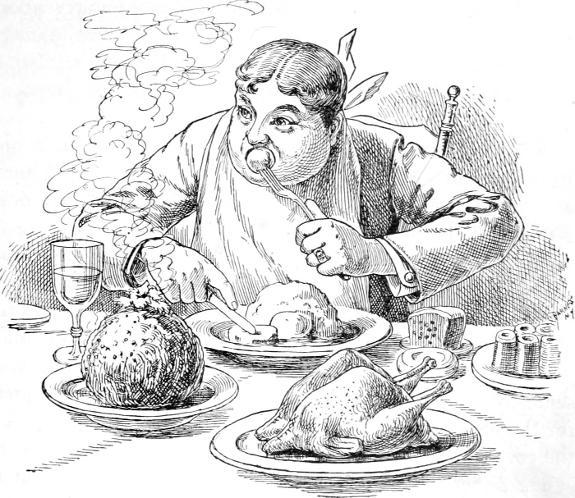The customary glutton of the 17th century
In 1654 chronicler Juan de Zabaleta described to perfection the daily life of a lover of good food in the Madrid of the Austrias
ANA VEGA PÉREZ DE ARLUCEA
Friday, 5 October 2018, 09:05
There are numerous words in Spanish to describe those who start to tremble at the knees with excitement at the sight of food, such as comilones, tragaldabas, sibaritas, glotones, zampatortas, triperos, tragones...in the end, though, the words which have been adopted are foreign: 'gourmet' and 'gourmand'. This is undoubtedly because they sound more elegant and are also more specific: a 'gourmand' is someone who delights in food and likes plenty of it, while a 'gourmet' is - according to the dictionary - a person of exquisite taste in food and drink. You can, of course, combine both concepts and be known as a 'comilón' (greedy person), enjoying such pleasures like a type of refined gastronome with touches of the comic book character 'Carpanta'.
The word 'gourmet' began to be used in Spain around 1840 and 'gastrónomo' a couple of decades before that. But at that time, despite the misfortunes suffered during the Napoleonic invasion, French cuisine had already become the definitive expression of good taste and cosmopolitanism. It wasn't that good food hadn't been appreciated before then, just that it was not really deemed acceptable to be obvious about it.
Eagerness and excess combined with concern over something so earthly was seen as a sign of frivolity, if not mortal sin or a certain effeminacy, which would have been improper in austere noblemen. For centuries, the Spanish were associated with sobriety, in their dress as well as their food, and that didn't change until the arrival of the Francophiles and their 'frivolités'.
Despite this, a large part of this supposed frugality was only by reputation. In the court of the Austrias, famous throughout Europe for its catholic gravity, there were some huge stomachs which joyfully practised the sin of gluttony. A confession here, a 'Hail Mary' to make up for it there, and that was that. At that time they were not called gourmets or gourmands, nor anything similar. The term 'glotón' covered everything and served to describe those who, without modesty or decency, spent the day thinking about what they were going to eat for breakfast, lunch and dinner.
The gluttons used to eat a great deal, well and messily, and in response to the affront that this posed to the expected decorum of a good Spaniard, they were generally considered the incarnation of all evils.
Zabaleta: the day of the party
That was the intention behind 'El glotón que come al uso', one of the nicest chapters in the book 'El día de fiesta por la mañana' (1654). It was written by Madrid author Juan de Zabaleta, playwright and chroniclerof King Felipe IV, who was uglier than Picio, according to thetaunts about him from Francisco de Quevedo. Ugly or not, Zabaleta was one of the first 'costumbrista' writers of Spain and he dedicated much of his work to reflecting satirically on the uses and customs of the Madrid of the Austrias, as dirty as it was dazzling.He situated one of his most famous books, 'El día de fiesta en Madrid y sucesos que en el pasán', in the city; it was divided into two parts, things that happened in the mornings and in the evenings, detailing the miseries of gallants, damsels, gamblers, courtiers and other inhabitants of the capital.
Like the moralist he was, Zabaleta intended to present his characters as rather undesirable types but in the case of the 'glotón' he failed somewhat. It proved impossible not to empathise with a man whose "stomach is the source of his anguish and his contentment", who eats breakfast in bed and is delighted to be knuckle-deep in sauce. Like the so-called 'foodies' of today, the gluttons of the 17th century would rummage in the far reaches of the larder to see if there was something delectable there, or would go to the 'figones' (the restaurants of the time) "to be given what they hadn't been able to find".
The author tries hard to make us look badly upon the glutton and share his distaste, but nowadays we know that the devil is not to be found in pleasure and there is nothing heavenly about being hungry, so we end up smiling as we read what the proud glutton enjoys eating: ham from Extremadura, salmon, rabbit, fried bacon, chicken with capers, pigeon, breaded sea bream, roast suckling pig, melons, cherries. All bought personally in the market, chosen with great care and whispering as he pays those who provide him with the freshest product: "He speaks from memory about three or four new sauces and another three or four invented dishes, all sounding so good that everyone's mouth begins to water". How can that be a bad thing, Zabaleta?
The 'glotón' continues his beatific culinary task, tasting wine, tearing bread and sharing his table with friends: enlivening life with lemon, mustard and pepper while the moralist, who is a pain, complains that cooks and witches "have equal malice" and "spells and stews, the same effect".
Just as well, then, that these days we are all more 'glotón', and less Zabaleta.


Comentar es una ventaja exclusiva para registrados
¿Ya eres registrado?
Inicia sesiónNecesitas ser suscriptor para poder votar.